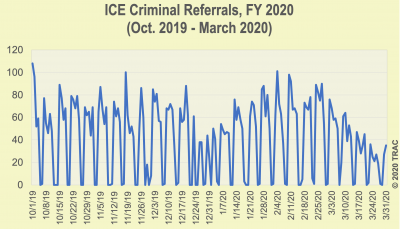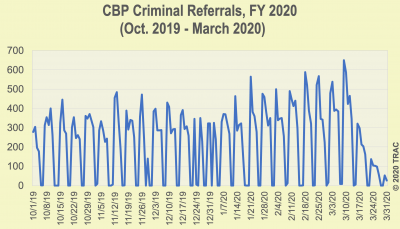Law enforcement agencies across the U.S. saw a major drop in the number of criminal cases they referred to federal prosecutors in March following the coronavirus outbreak, new data shows.
According to data published by the Syracuse University’s Transactional Records Clearinghouse (TRAC), referrals for federal criminal prosecution dropped to their lowest point this fiscal year at the end of March, with referrals declining from 1,000 a week in the first half of the month to around 400 a week by the end of March.
The drop was noticed across federal law enforcement agencies, with both the Customs and Border Protection (CBP) and Immigration and Customs Enforcement (ICE) agencies seeing a significant decline in the number of criminal cases they referred to federal prosecutors in the wake of the COVID-19 outbreak.
At CBP, referrals appeared to decrease as the U.S. came to grips with the nationwide threat that the coronavirus outbreak posed.
In the week of March 10, the agency had seen a spike, referring more than 600 criminal cases, but by the end of the month, the numbers dropped significantly, with CBP referring just over 100 cases in the week of March 23 and around 50 cases in the week of March 31.

ICE saw a similar drop, with the agency’s criminal case referrals seeing a gradual decline from around 90 referrals a week at the start of the month to less than 40 by the end of March, with a slight uptick in the week of March 31.
According to TRAC, in the first six months of fiscal year 2020, immigration-related referrals accounted for the majority of all federal criminal referrals.
While all federal law enforcement agencies, including the Federal Bureau of Investigation (FBI), the Bureau of Alcohol, Tobacco, Firearms and Explosives (ATF), and the Drug Enforcement Administration (DEA) saw a drop off in March, the number of referrals from CBP and ICE appeared to decline more sharply than the overall trends across federal law enforcement agencies.
A reported drop in illegal border crossings could explain the decrease in CBP referrals.
However, the reason behind ICE’s early decline in referrals in March is less clear.
“While the reported drop in illegal border crossing could help explain the drop in CBP’s referrals, it would not appear to account for the drop for ICE, which is responsible for enforcement in the interior of the country,” TRAC researchers noted.
ICE had only announced plans to halt most interior arrests amid the pandemic on March 18, they noted, so the gradual decline in ICE referrals early on in the month, could have been driven by an earlier internal response to the outbreak.
Newsweek has contacted both ICE and CBP for comment.
 Immigration and Customs Enforcement’s (ICE) special agent preparing to arrest alleged immigration violators at Fresh Mark, Salem, June 19, 2018. The agency saw a drop in criminal case referrals in March, following the coronavirus outbreak. Smith Collection/Gado/Getty
Immigration and Customs Enforcement’s (ICE) special agent preparing to arrest alleged immigration violators at Fresh Mark, Salem, June 19, 2018. The agency saw a drop in criminal case referrals in March, following the coronavirus outbreak. Smith Collection/Gado/Getty


















